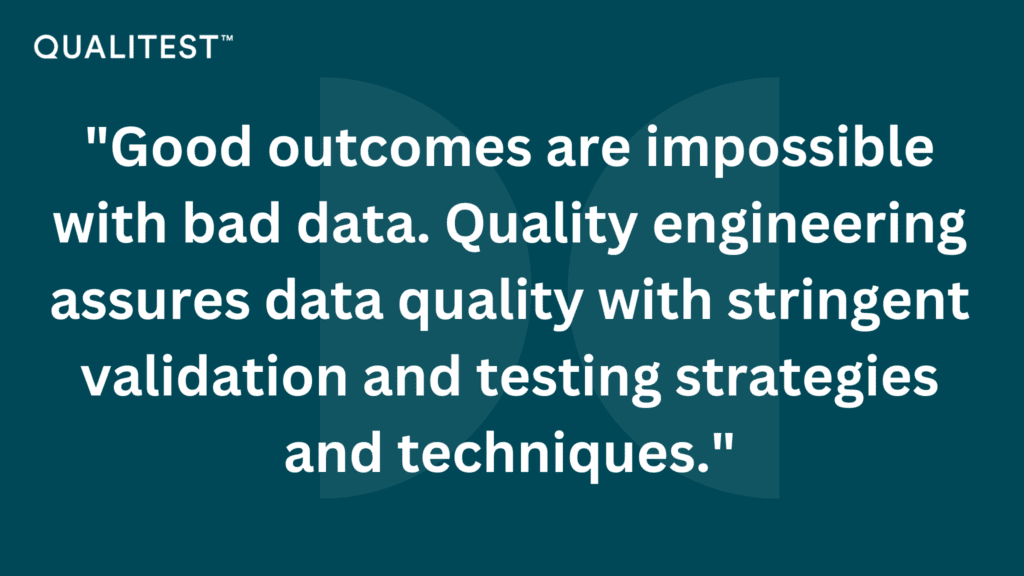How Strategic Quality Engineering Enhances Retail & Consumer Goods Outcomes
- Kenny Small
- Senior Vice President and Head of US SAP and Enterprise
-
Mar 08, 20244 min read
The link between enterprise quality engineering and business success in the Retail & Consumer Goods (RCG) sector is increasing in criticality alongside the expansion of channels, acceleration of real-time consumer interactions and harvesting of data. Validating the integration of Enterprise Resource Planning (ERP) systems within the sector is pivotal to achieve high-impact business outcomes.
An ERP system acts as the central nervous system of a company, integrating core business processes and providing a source of accurate, real-time information. Focusing on two crucial RCG business outcomes—increased sales through personalized engagement and profit optimization with predictive analytics—reveals how enterprise Quality Engineering directly contributes to tangible business improvements.
We are seeing increasing deployments and modernization of Customer Relationship Marketing (CRM) and Customer Data (CDP) platforms to drive personalization, ensuring consumers receive tailored product recommendations and marketing communications. This personalized engagement fosters a deeper connection between the consumer and the brand, leading to an enhanced shopping experience that encourages higher purchase frequencies and larger basket sizes.
Enterprise CRM and CDP systems aggregate customer data across multiple touchpoints, providing a 360-degree view of the customer journey. This comprehensive understanding enables businesses to create highly personalized experiences, but it introduces risk with a significant increase of data and integrations.
Quality engineering techniques reduce risk by validating early that personalization algorithms ingest accurate data from the various sources and interact through the appropriate channels. Issue resolution is accelerated, thereby directly influencing sales growth and enhancing customer experience. Implementing change impact-based testing for updates to personalization engines means that any changes in the backend are immediately evaluated for their potential impact on the customer experience. Automated tests are triggered based on the identified changes, ensuring that new features enhance rather than disrupt the customer journey.
This is particularly important when you have zero margin of error, e.g. when using real-time data to drive promotional offers during Black Friday and other peak buying periods, preventing events such as cart abandonment. For real-time promotions, automated tests can be triggered seamlessly to provide assurance and confidence that revenue will be captured. This approach not only accelerates the time-to-market for new features, but also protects against potential dips in sales due to technical issues, thereby maintaining a trajectory of sales growth.

Another trend we are seeing is using business scenarios of predictive analytics to align supply with demand, capitalize on market opportunities, avoid overstocking or stockouts that could result in lost sales, and adjust pricing strategies.
Many ERP systems come equipped with advanced analytics capable of processing complex datasets to forecast demand and optimize inventory levels. What we are seeing today is that this data is ever-growing and coming from more and more sources, driving ERP vendors to respond and provide increased capabilities.
Quality engineering secures this outcome by testing the predictive analytics tools themselves, so business can make informed decisions that maximize profitability while minimizing excess inventory and markdowns. To assure the ever-growing amounts of data from multiplying sources requires increased levels of shift-left data validation techniques, as well as robust data integrity solutions and strategies:
Good outcomes are impossible with bad data. Quality engineering assures data quality with stringent validation and testing strategies and techniques:
Enterprise quality engineering is more than just a support function; it’s a strategic partner in the RCG sector. By focusing on enhancing customer engagement and optimizing profits, organizations not only improve customer experiences but also drive significant business growth. Commitment to rigorous testing and validation means that ERP systems are not just implemented, but continually optimized to deliver on their promise of enterprise-wide excellence.
As businesses navigate the complexities of the retail landscape, our strategic ERP solutions stand as a beacon for achieving customer satisfaction, operational efficiency and robust business growth.
